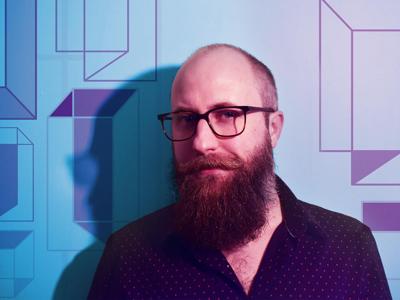There’s something about the imaginative quality of M.C. Escher’s work — its fascination with reflections, symmetry, geometry, loops and other more complex mathematical structures — that gives it an almost musical language.
That was the thought behind commissioning composer/guitarist George Fetner to write a new piece to “score” the Columbia Museum of Art’s ongoing exhibit “The Imaginative Worlds of M.C. Escher,” anyway.
“There’s a lot of music in [Escher] visually,” the composer asserted. “You see certain things and you're like, well, that reminds me of this musical idea. And it's just the visual representation of what he did. There's so much music in it. So I was starting from a place where I felt like the material is there, I really just kind of had to shape it and put it into the sound.”
Fetner, who has a Master’s in composition from the University of South Carolina and has been a fixture in the popular music and classical music scenes in Columbia for more than a decade, was a natural fit for the job given his diverse interests and background, which ranges from esoteric electro-acoustic classical compositions to playing in indie rock and jam bands.
“The only requirement was that it be evening-length, so an hour long,” he said of the directive he received when the museum reached out to him last fall. “Which is kind of daunting, because, you know, sometimes the less restrictions you have, the harder it is to know what you're going to do.”
Fetner had previously scored some silent movies for the CMA in early 2020, working with classical musicians, but he decided to take a more hybrid approach for the Escher composition, entitled “Three Worlds,” which will debut outdoors on the Boyd Plaza.
“I had an ensemble already in mind and people who are on board to perform,” he said, explaining he secured the services of drummer/percussionist Jeff Vaughn and multi-instrumentalist Moses Andrews. “I knew I wanted to do something that had some electric components and some electronic components, because I haven't done something like that in a while. And then it was pretty easy.”
Fetner worked through a few books on Escher and the CMA exhibit to select eight pieces to correspond to the eight movements, which range from Steve Reichian levels of repetition to meditative, hymn-like reveries.
“It's a composed piece, but there's a lot of non-musical notes, or directions is a better way to say that, in the scores that are verbal or graphic, instead of actual notes,” Fetner offered. “It's a mixture of everything, but it's a score meant for people who can obviously read music, but then also can interpret things and improvise on their own.”
He also composed with his performers in mind, cognizant of Vaughn’s knowledge of world and popular music and aptitude with electronic drums, and Andrews’ expertise with synthesizers and keyboards.
“It would be hard for someone who doesn't have the gear that Moses has to be very detailed about what kind of sounds I want,” the composer continued. “A lot of it was, ‘Hey, I think I'd like you to try these types of sounds.’ So he's trying things and he's kind of bringing his expertise to the table.
“In a lot of ways, it's not unlike a jazz ensemble, where you're relying on your musicians to bring the actual sounds to the score that make the most sense.”
The trio is excited to debut the piece, particularly given the lack of opportunities for performance and collaboration throughout the pandemic. Fetner said the commission gave him a set goal and expectation during the period, which, aside from a few special events — like the live-streamed version of Five Points’ Jerryfest that his band the Strays participated in — was otherwise spent working on unfinished songs or cycling through his classical guitar repertoire.
“Rehearsal has been super-intense, because you're doing something that you've done your whole life that you haven't done much in the last year,” he described. “All of a sudden that you just sort of click back into it.”
George Fetner’s “Three Worlds”
May 13. 7 p.m. Boyd Plaza (outside the Columbia Museum of Art). 1515 Main St. $5-$25 (registration required). columbiamuseum.org.









